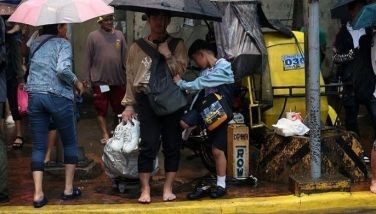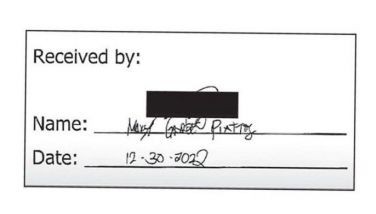CJ denies owning $10-million account
MANILA, Philippines - Chief Justice Renato Corona thumbed down yesterday calls for him to explain his alleged $10-million bank deposits before the impeachment trial that resumes today.
After meeting with his lawyers, Corona issued a denial and instead said Ombudsman Conchita Carpio-Morales should explain why she initiated an investigation on an allegation not supported by evidence.
“I don’t own any such $10-million deposit. It simply does not exist,” Corona told The STAR.
Corona sees no need for him to face the Senate sitting as an impeachment court.
“How can anyone be made to explain something that does not exist?” he asked critics who are urging him to explain the alleged hidden wealth during the trial.
Malacañang has admitted that the Ombudsman’s letter requiring Corona to explain his reported $10-million deposits may be used in 2013 for the filing of another impeachment complaint, in case he gets acquitted this year.
“That was a statement made by the Ombudsman in her letter to the Chief Justice,” Secretary Edwin Lacierda said in his opinion, citing the “tenor” of Morales’ April 23 letter to Corona.
Corona, however, called on the Senate to invite Ombudsman Morales to the trial should the House prosecutors raise this new allegation at the resumption of hearings.
“Why doesn’t the Ombudsman instead explain how she came up with that incredible, fantastic and mind-boggling amount?” he stressed.
Corona’s lawyer and spokesperson Ramon Esguerra said the prosecution would have to pass through obstacles before they are able to present the Ombudsman.
“They have to hurdle the bar. They have to hurdle the ruling of the Senate,” he said.
Esguerra said the allegation by the Ombudsman falls within provision 2.4 of the impeachment complaint against Corona, which the Senate had already quashed.
In an earlier resolution, the senator-judges disallowed prosecutors from submitting evidence on paragraph 2.4 of Article 2 of the complaint, while allowing the entry of evidence for paragraphs 2.2 and 2.3.
They decided to drop article 2.4 of the complaint, or the alleged ill-gotten wealth of Corona, which had been the rallying cry of the prosecution in their effort to seek a conviction for betrayal of public trust and culpable violation of the Constitution.
Pushing on this allegation would mean amendment of the impeachment complaint, Esguerra argued.
The Ombudsman reportedly started an investigation against Corona after receiving letters from various individuals and groups accusing the Chief Justice of owning $10 million in bank deposits.
Morales issued an order recently asking Corona to explain the alleged wealth that was not disclosed in his SALN over the past years.
It was learned, however, that the complaints did not have any supporting document or even testimony to support the charge.
Lawyers of Corona questioned this move of the anti-graft office, saying investigation in a criminal or corruption charge should not start without ample basis.
Morales was the only justice of the SC who opposed the appointment of Corona as chief justice by former President and now Pampanga Rep. Gloria Macapagal-Arroyo during the 2010 election period.
President Aquino chose Morales to administer his inaugural oath and appointed her Ombudsman last year.
Meanwhile, a survey done by an independent research and consulting firm showed many agreed with Corona’s claim that Aquino was only “exacting revenge” over the Supreme Court’s decision to distribute Hacienda Luisita to farmers.
Forty-seven percent agreed that the impeachment trial is Aquino’s way of getting back at Corona, a survey done by StratPOLLS, Inc. showed.
This shows a slim margin over the 45 percent who believes otherwise.
StratPOLLS said, however, that the decision has “created an impact” on the minds of those following the trial.
The Makati-based firm took the survey between April 28 and May 3. It asked 1,000 adult respondents in Metro Manila questions meant to correlate the impeachment trial with that of the Hacienda Luisita decision.
In a final and executory ruling announced by SC spokesman Jose Midas Marquez on April 24 in Baguio City, the high court stood pat on an earlier decision ordering the distribution of the sugar estate owned by the maternal relatives of Aquino.
Eight of the magistrates also voted to compensate landowners based on the Nov. 21, 1989 valuation instead of 2006 rates.
Asked later if the Aquino administration will retaliate after the high court issued its final ruling, Corona told reporters “sigurado (I’m sure).”
The chief magistrate has always believed that the high court’s order on the distribution of the lands is the reason why Aquino wants him out of the high court. Malacañang, in turn, has consistently denied this.
With regard to Corona’s assertions that the $10-million charge is only a “retaliatory” attack, Lacierda called on Corona to be more circumspect in his accusations, as facts do not prove such claims.
“The Chief Justice received the Ombudsman letter April 23, a day before the SC decision in the Hacienda Luisita case. Obviously, the letter could not be in retaliation (for) the decision because the letter requiring CJ to explain came a day before the decision.
“It is highly possible that since the CJ already knew that he was required to explain by the Ombudsman, he is now conditioning the public to think the letter was a retaliation, when in fact it came before the Hacienda decision,” he said.
“The Chief Justice should be more prudent with his statements, it clearly shows his unstatemanlike behavior,” Lacierda maintained.
In the same survey by StratPOLLS, 79 percent are aware that Aquino’s relatives own the sugar estate.
Asked if the SC decision was correct, 94 percent said “yes” while five percent said “no.” – With Delon Porcalla
- Latest
- Trending





























